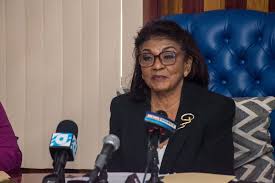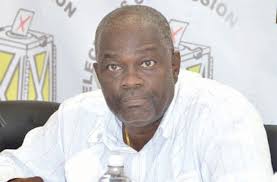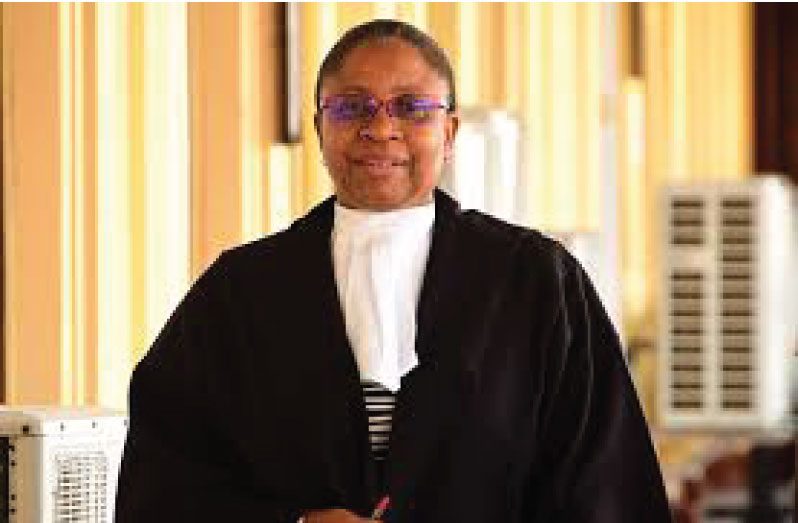…says March declarations no longer useful
…CEO must comply with directives of GECOM
By Svetlana Marshall
CHIEF Justice (ag), Roxane George-Wiltshire, said that the results of the General and Regional Elections must be declared based on the data generated during the National Recount, effectively ruling out the notion that the Guyana Elections Commission (GECOM) can revert to the declarations made by the 10 Returning Officers in March.
“As concluded, given the decisions of the Court of Appeal and the Caribbean Court of Justice, the recount cannot be considered to be invalidated, at least not at this point in time. In this context, the Section 84 (1) declarations can no longer be considered useful,” the Chief Justice said as she handed down her judgment virtually via a live broadcast on Youtube.
Justice George-Wiltshire later added that: “…as determined by the CCJ, unless overturned by a Court in an election petition, the only data that could be used for the declaration of the results of the elections would have to be the recount results or data.”
The applicant – Tucville voter, Missenga Jones had sought a total of 28 declarations and orders from the High Court – compelling the Elections Commission to declare the results of the General and Regional Elections based on the March declarations, as advised by the Chief Elections Officer (CEO), Keith Lowenfield, in his latest Elections Report. Jones, however, through her attorneys, vowed to appeal the decision of the High Court.

Through a battery of lawyers led by Trinidad and Tobago Senior Counsel, John Jeremie, Jones had argued that Order No. 60, which triggered the National Recount, was unconstitutional and on that basis, the data generated during that process could not have been relied upon for a declaration of the results of the Elections. Further, her attorneys together with the lawyers that represented the Chief Elections Officer, Keith Lowenfield; and the Attorney General Basil Williams had argued that the Caribbean Court of Justice (CCJ), in its July 8 judgement in the case – Irfaan Ali and Bharrat Jagdeo v Eslyn David and others – had invalidated the Recount Order on the grounds that it created “a new electoral regime,” and that the results ought to be made based on the declarations made by the Returning Officers in accordance with the Representation of the People Act.
Paragraph 37 of the CCJ judgment states: “The Presidential Candidate on the list for which more votes have been cast than any other list is deemed to be elected as President, and the Chairman of GECOM must so declare. Both the allocation of seats in the National Assembly and the identification of the successful Presidential Candidate are determined on the sole basis of votes counted and information furnished by Returning Officers under the Representation of the People Act.”
But, the Chief Justice, in endorsing the submissions made on behalf of the Chairman of GECOM, Justice (Ret’d) Claudette Singh by Attorney-at-Law Kim Kyte-Thomas, ruled that the CCJ did not invalidate Order No. 60 but rather endorsed the National Recount.
“This, the interpretation of the CCJ decision by the applicant, the CEO and the AG is hopelessly flawed. The CCJ judgement lends to the ineluctable conclusion that the recount votes are ex facie valid,” Justice George-Wiltshire ruled.
It was explained that the reference to a “new electoral regime” made by the CCJ was done in response to the decision of Justice Brassington Reynolds in the Court of Appeal that Order No. 60 had established a new elections regime with separate elections for members of the National Assembly on one hand and, an election of the person deemed to be president, on the other. Justice George-Wiltshire clarified that the apex court had ruled that Justice Reynolds’ line of reasoning was flawed.
Emphasising that paragraph 37 of the CCJ’s judgment cannot be read in isolation, Justice George-Wiltshire pointed out that in paragraphs 38 and 39 of its judgment, the apex court, in highlighting the procedures of the recount exercise, noted that the objective was to allow for “an open, transparent and accountable recount of all the votes cast” at the March 2 Elections.
“The CCJ re-emphasised that Order No. 60 did not and could not create a new election regime. This was a clear reference to its finding as regards the decision of Reynolds. The Court did not, in explaining how any tension between the Constitution and subsidiary legislation should be treated, negate or nullify Order No. 60 either expressedly or impliedly,” the Chief Justice ruled.
Against that background, Justice George-Wiltshire ruled that Jones’ contention that Justice Singh’s letters to the Chief Elections Officer are invalid, has no merit. In three letters dated June 16th, July 9th and July 13th, the GECOM Chair had instructed that the Elections Report be compiled in accordance with the Certificates of Recount generated during the National Recount conducted in May-June.
MARCH DECLARATIONS OF NO USE
In turning her attention to the validity of the declarations made by the Returning Officers in the 10 Electoral Districts, the Chief Justice said the electoral process has long gone past that stage. “My conclusion as regards the interpretation of the CCJ decision regarding Order No. 60, necessarily mean that the answer to this issue is that the declarations of the Returning Officers as made pursuant to Section 84 [of the Representation of the People Act] have been overtaken by events whereby GECOM, in its wisdom, considered that there were difficulties that had to be addressed in order to produce what is termed in Order 60 as a credible count,” Justice George-Wiltshire said.
Recount data valid

The Chief Elections Officer, through his attorney – Senior Counsel Neil Boston – had argued that it was his constitutional mandate to advice the Elections Commission in accordance with Representation of the People Act but the Chief Justice said it is the Chairperson and GECOM that have constitutional mandates. According to her, the CEO is simply a functionary of GECOM.
“Section 18, which is repeated in Order No. 60, merely confirms this and for the avoidance of doubt – that the CEO cannot act on his own,” she said while ruling that Section 18 of the Election Law (Amendment) Act is not unconstitutional or in conflict with Article 177 (2) (b) of the Constitution. “If it is the considered opinion of the CEO that in face of Order No. 60, he can produce a report based on Section 84 declarations, then one would expect that he must be guided accordingly by GECOM. This, the evidence discloses the Chairperson has sought to do via the letters transmitted to the CEO. Thus, as determined by the CCJ, unless overturned by a Court in an election petition, the only data that could be used for the declaration of the results of the elections would have to be the recount results or data,” the Chief Justice said.
Justice George-Wiltshire added: “For the reasons outlined, the ten declarations cannot be resurrected at this point in time. In this regard, there can no longer be an impasse between the Chairperson and the CEO as to the effect of Article 177 (2) (b) and Section 96 [of the Representation of the People Act]. For the avoidance of doubt as stated in Section 18, the CEO is subject to the direction and control of the Commission.”
Relying further on the judgements of the CCJ and also the Court of Appeal, the Chief Justice made it clear that issues regarding irregularities during the electoral process must come via an Elections Petition in accordance with Article 163 of the Constitution, which gives the High Court exclusive jurisdiction to adjudicate over such matters. According to the National Assembly (Validity of Elections) Act, Election Petitions must be filed within 28 days of the declaration of the results of an election.
JURISDICTION AND RES JUDICATA
However, before addressing the meat of the matter, the Chief Justice, from the onset, had assumed jurisdiction to hear the case. The respondents in particular the Chairman of GECOM and the added respondents including the People’s Progressive Party/Civic (PPP/C) General Secretary Bharrat Jagdeo and Presidential Candidate, Irfaan Ali, had argued that the Court had no jurisdiction to hear the case brought by Jones. But Justice George-Wiltshire, in assuming jurisdiction, said that there was a distinction to be drawn as regards enquiring into the functions of the Chair of GECOM and the Elections Commission, which are restricted by Section 140 of the Representation of the People Act, and interpreting the constitutionality of Section 22 of the Election Law (Amendment) Act, Order No 60 and Article 177 (2) (b) of the Constitution to determine the lawfulness of their actions. The Jurisdiction, she posited, was a narrow one, aimed at treating with the legal framework employed during the electoral process.
But while the Chief Justice ruled that she had jurisdiction to entertain the application brought by Jones, she ruled that the majority of the issues highlighted in the application is “res judicata” – meaning there were adjudicated by a competent court and could not be pursued further by the same or any other party with similar intention. The constitutionality of Section 22 of the Election Law (Amendment) Act, as raised by the applicant, was one such issue. “Apart from Section 22, which was specifically cited, there are a number of reliefs claimed in this application which were claimed in or are mirrored in the claims in [Ulita] Moore, and which I consider cannot be re-litigated,” the Chief Justice said as she cited a number of examples.
Dissatisfied with the decision of Justice George-Wiltshire, Jones, through her lawyers indicated that she will appeal the ruling.











